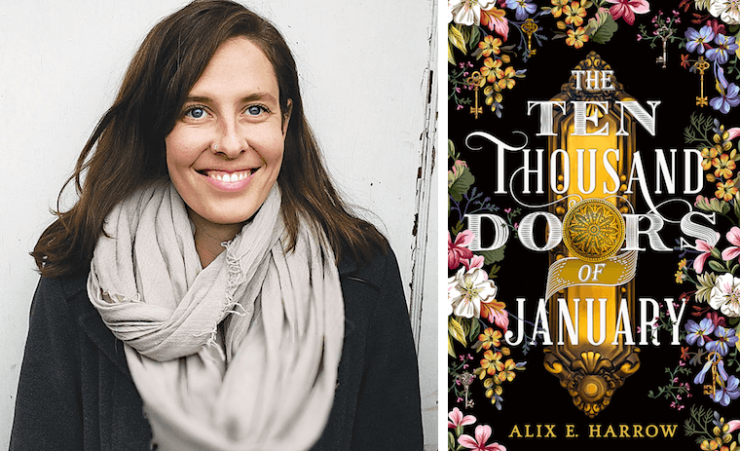Alix E. Harrow, debut author of Ten Thousand Doors of January, recently hosted an AMA on Twitter. Harrow, a former history adjunct professor and part-time librarian, recently won a Hugo for her short story, “A Witch’s Guide to Escape,” and is a finalist for the Nebula, Locus, and World Fantasy awards. Many of Harrow’s AMA answers cover publishing, advice, inspiration, and her preferred fictional worlds and characters.
On the publishing process:
The timeline went like this: I wrote it over about three years. Just as I was finishing a pretty big rewrite, I published a short story (“A Witch’s Guide to Escape”), and it got passed around on twitter a little bit. I got a DM from an editor at Orbit and an agent at Howard Morhaim asking if I happened to have anything longer. “Why,” I said, “give me a week to polish this manuscript.” Then I sent it to them and they liked it and all my childhood dreams came true at once.
It was about a year from finishing edits to publication, but I know I got very, very, VERY lucky. Stupid lucky. Obnoxiously lucky.
[…] This book was written and published as an adult novel, but it has some crossover appeal.
I didn’t intend to write a young adult novel at all. It was only as the first readers started reacting to it that I realized my protagonist was, in fact, a minor, and that there wasn’t any R-rated content, and that the entire thing was in many ways a coming-of-age story.
Some people might see those elements and categorize it firmly as young adult—I get it! and I read and love YA, so i have nothing against it!—but I find myself a little resistant. It’s something that happens more often to women authors (especially women of color) and there’s something about it that implies that adult readers couldn’t possibly be interested in the stories of young women. That their stories are lighter-weight or un-serious in some way. That coming-of-age is itself a process that only happens once, rather than several times throughout our lives.
Anyway: book marketing is strange and nebulous and imprecise, and we’re all out here doing our best, and ultimately most of us write books for ourselves and hope desperately that someone else might read them, whatever age they are.
On writing with small kids:
My first kid was born in the middle of the first draft of this book, and he didn’t help at all. I wrote the second half at four in the mornings and stolen lunch breaks, constantly running the numbers and concluding that it was impossible, that it didn’t add up, that I’d never finish. But then I….did? After I got my contract, I was able to quit my full-time job and write the second book while my husband watched the kids.
On using outlines:
I’m a huge outliner and planner—the idea of wading into a draft with no map at all makes me feel vaguely ill—but that outline almost always turns out to be wrong. It’s kind of like listening to a story told by an unreliable narrator or following a map drawn by a toddler with a crayon, desperately trying to make sense of it as you go.
I outline the living shit out of everything I write. I outline emails. I outline grocery lists.
But I’ve recently admitted to myself that my outlines aren’t very…..accurate. they look good; they have bullets and headings and thousands upon thousands of words, but in the end they don’t look very much like the final draft. If I’m being honest with myself, I think I use outlines more like a rough, rough draft. I think it helps me identify and then discard my first idea, which is usually the most boring/cliche/stupid one.
On her favorite authors and genres:
I love old-timey adventure stories (The Count of Monte Cristo) and 19th century children’s fiction (Peter Pan, E. Nesbit), I love 1990s girl fantasies (Tamora Pierce, Sabriel), I love literary dramas about family and love (Karen Joy Fowler, Celeste Ng, Jesmyn Ward), I love campy swashbuckling fantasy and space operas (Patricia Briggs, Lois McMaster Bujold), I love weird, in-between books that are entirely themselves (Jonathan Strange & Mr Norrell, The Library at Mount Char).
Top 3 fictional worlds to visit:
- Lyra’s Oxford (because daemons)
- Earthsea (because true names)
- Hogwarts (because…..look, it’s grooved really, really deeply into my brain, I’m sorry for my unoriginality, I just really want to go to magic school)
Bonus: the number one fictional world I would stay the hell away from is the world of the Broken Earth, which is trying at all times to annihilate its occupants.










